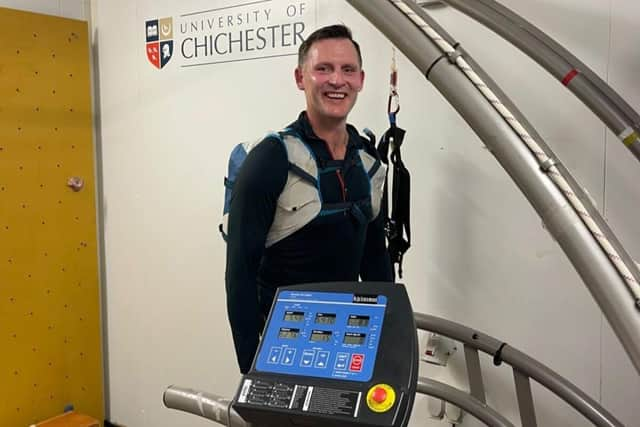Sergeant Major uses university’s heat chamber ahead of Sahara running challenge
and live on Freeview channel 276
Rinder’s Run saw a team of Army professionals join him on gruelling challenge across some of the harshest terrain on earth in aid of the Army Benevolent Fund, raising more than £25,000, and the Army Sergeant Major Paul Carney made the most of the facilities at the Chichester campus in March.
He said: “Many people have heard the phrase ‘if you fail to prepare, you are prepared to fail’ and that couldn’t be truer in the military.
Advertisement
Hide AdAdvertisement
Hide Ad“With that mindset and in my preparation to complete the Marathon Des Sables whilst raising money for the Army Benevolent Fund I took advantage of the British Army’s close relationship with the University of Chichester to spend an hour in the heat chamber and ensure that my body can cope with physical exercise under tough conditions.


“Although ‘Salty Sweater’ wasn’t a title I was expecting, the professionalism of the team and the advice they have provided has built further confidence in myself on being able to complete the 250km race in the Sahara Desert.”
Exercising in the heat chamber allows a runner’s internal body heat to rise above 38.5°C in order to help get the body used to running in hot temperatures. The sessions are supervised by the University’s scientists and are used by athletes training for events in hot and humid climates.
Dr Andy West, a Senior Lecturer in Sport and Exercise Physiology who leads on the physiology testing services delivered by the University’s Sports Performance and Rehabilitation Unit, said: “Over the past 10 years we have developed an excellent reputation for providing sport science support work to athletes of all levels competing in events in hot climates around the globe including the Marathon des Sables, Spartathlon, Badwater 135 and Ironman world championships in Kona. Sgt Major Carney follows in the footsteps of more the 100 athletes who have used our facility to train for a wide range of challenges.”
Advertisement
Hide AdAdvertisement
Hide AdThe Marathon Des Sables saw Sgt Major Carney run 250km over six days across the Sahara Desert alongside Rob Rinder from April 12. They were joined Olympic champion Major Heather Stanning OBE, Infantry Colonel Mark Nooney MC and Army Corporal Natalya Platonova.
Sgt Major Carney joined the Army in 1997 and has served in the Balkans, Iraq and Afghanistan. His engineering expertise is vast, from demolition to bridging. As the British Army Sergeant Major, he is the most senior soldier in the Army and is a Trustee of the Army Benevolent Fund.
The environmental chamber is intended for athletes who walk, run, cycle, and row around the globe to replicate temperature and humidity from minus-20 to plus-50 degrees Celsius and from ten to 90 per cent respectively. It can also simulate altitudes of up to around 22,000 feet by reducing the oxygen concentration in the room from approximately 21 to nine per cent.
To find out more about heat acclimation training using the environmental chamber and the other services offered by the Sport Performance and Rehabilitation Unit, visit: www.chi.ac.uk/collaborate/business-and-employers/access-to-expertise/sport-expertise/sports-performance-and-rehabilitation/